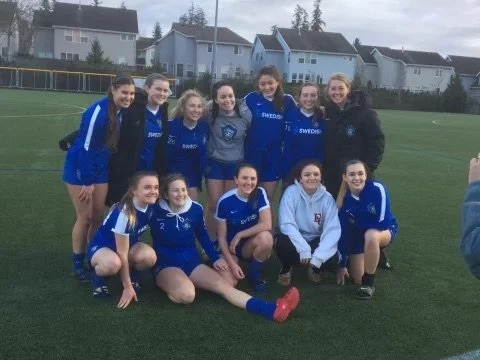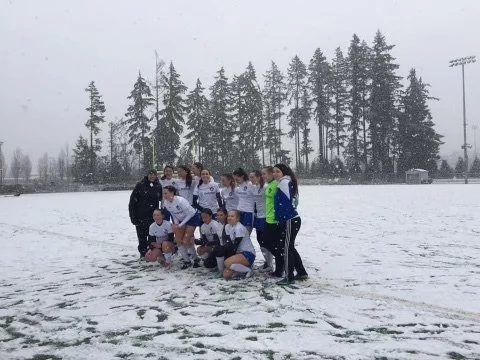This Is Your Only Job On The Hard Days
A good coach stays regulated when her players are unable to.
Of course there are the hard days.
On a tough day, coach and players are at odds with each other. We have different visions and very different ways of achieving those visions. On a tough day, I am the only thing standing in the way of turning a bad practice into a terrible one. I have to stay calm in order to be an effective, mature, and kind person. I have to stay regulated even when I don’t want to.
Some days this is very difficult.
My players are all turning fourteen and fifteen this year. They are going to high school, growing up, discovering young adulthood, making friends, losing them, dating, breaking up, failing tests, fighting with their parents, and about to start driving. Being fifteen-years-old is a full-time job. I am only ten years out from fifteen, and on the hard days, I can really feel how close I still am to those days. When my girls are angry, exhausted, snarky, suffering, in pain, frustrated, overwhelmed, and worn out, it is especially important that I stay regulated around them.
Even when their dysregulation threatens to take me out, too.
There’s a Good Inside podcast episode by Dr. Becky Kennedy where she compares parenting to being a pilot. Say you’re flying across the Atlantic and a big wave of turbulence hits. The plane is rattling and dropping and everyone is freaking the f*@k out.
A good pilot is not going to get on the intercom and yell, “GOD, would you all just SHUT UP back there? I am going to crash this plane if you don’t give me two god-damn seconds to hear myself think!”
A good pilot also doesn’t start panicking. “O-oh my gosh, uh, you guys, it’s been a while since I’ve done this, does anyone else want to try to get in here and fly the plane? I’m not sure if I’m really the best person to do this job… can someone come into the cockpit please?”
The cabin of the plane might go quiet. One brave person might even volunteer to fly the plane, and they may even land it safely. But every single passenger would lose trust in their captain. A terrified passenger has to trust that the person in charge of the plane is not freaking out. That is the social contract they have both signed.
My mom once told me after a particularly turbulent flight together, “Even when I was scared, I couldn’t be more scared than you were. That’s my job as your mom.”
My mother felt a responsibility to keep her shit together when I lost mine. I guess I feel the same responsibility now.
One player rolled her eyes at me before practice started and brazenly tossed over her shoulder, “Soccer isn’t even fun anymore.”
Another huffed to her teammate, “This is the worst practice EVER!”
I’ve heard:
“I should’ve just stayed home and studied for my test tomorrow.”
“I HATE this drill.”
“The other team only wants to play us because they know we suck.”
“It’s cold.”
“It’s late.”
“I don’t feel like it.”
“I don’t want to.”
“I wish I wasn’t here right now.”
“Why are we even doing this?”
There’s no harsher critic than a stressed-out teenager learning something new in the rain at 8:30PM on a school night.
On the bad days, sometimes my inner-teenager (the kid inside me that can still feel what it’s like to be where they are, the one that desperately wants to be liked and accepted, the one with an attitude problem… I could go on!) wants to unravel right there with them, stomp my feet, and huff straight back.
Thank God, I have never let my inner teenager win out over the external adult I’m meant to be. With them, I mean. Nobody ask my boyfriend what he thinks!
In any case, whether this is due to an iron grip on my own free will or direct holy intervention remains to be seen.
“No, I’M having the worst week ever,” I could snap. I’m stressed, or fighting with my parents, or late on a deadline, or this or that or whatever else they have no idea has my empathy tank running on empty. What about ME? the voice inside my head starts to rage. But a good leader doesn’t take on someone else’s dysregulation.
A good coach gets curious. Or they burrow down into their calm and set up camp there.
“Hey, I overheard you say that this is the worst practice ever. What’s going on? Do you want to talk about it with me?” I could have asked.
Truthfully, I actually didn’t want to know why this was the worst practice ever. Whatever she would’ve answered, I would’ve ruminated on and gotten pissed about. So I didn’t ask. If you’re not able to get curious, go quiet. Let them have the space to say those things to each other, and continue with your lesson plan (which, by the way, I thought was super engaging and interesting and fun… but apparently not). Whatever.
Manage the disrespect, and let the other stuff slide. I’ve pulled the, “Do not speak to me like that.” and “Go grab some water and cool off. No, I’m not asking.” and it sucks. My hands shake and my stomach gets all queasy and my throat gets that thick ache like I’m about to start crying. Of course I want them to have fun. Of course I want them to like me. Sometimes they won’t. Sometimes they don’t.
And it’s just part of the job.
That’s my responsibility now: to manage my own shit and make space for theirs, especially when it’s messy and ugly and loud and rude. It’s part of loving children. It’s part of leading people. And if you can’t do it, you need to step back and figure out why. And then work on it, everyday.
What I’ve learned: If you can’t handle an honest answer, don’t ask. Continue as normally do, stay as calm as humanly possible, and cry it out when you get back to your car. Call your own mom and beg for forgiveness for how you were when you were fifteen.
Then show up again and work to make it a better experience next time.
Thankfully, I had coaches who showed up on my tough days. And also snow days!
The MVP award, however, goes to my mom and my dad, both of whom deserve a very large cash prize for loving me through the hell I gave them. <3


